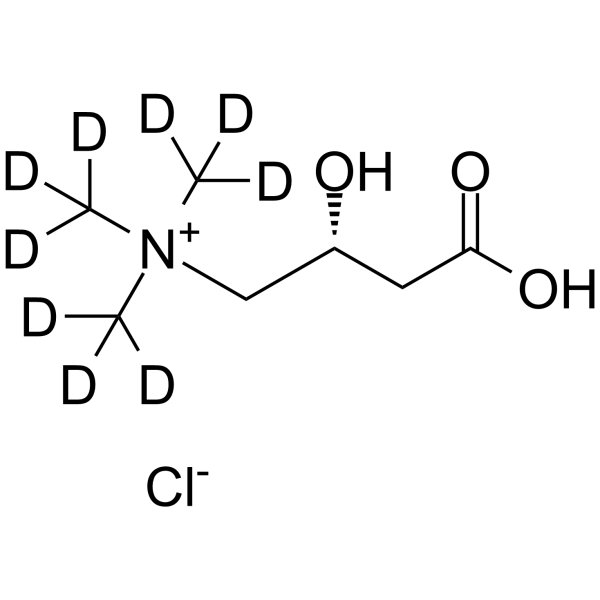L-Carnitine-d9 chloride
Modify Date: 2024-01-06 17:33:33

L-Carnitine-d9 chloride structure
|
Common Name | L-Carnitine-d9 chloride | ||
|---|---|---|---|---|
| CAS Number | 2687961-04-0 | Molecular Weight | 206.72 | |
| Density | N/A | Boiling Point | N/A | |
| Molecular Formula | C7H7D9ClNO3 | Melting Point | N/A | |
| MSDS | N/A | Flash Point | N/A | |
Use of L-Carnitine-d9 chlorideL-Carnitine-d9 chloride is the deuterium labeled L-Carnitine chloride. L-Carnitine chloride, a highly polar, small zwitterion, is an essential co-factor for the mitochondrial β-oxidation pathway. L-Carnitine chloride functions to transport long chain fatty acyl-CoAs into the mitochondria for degradation by β-oxidation. L-Carnitine chloride is an antioxidant. L-Carnitine chloride can ameliorate metabolic imbalances in many inborn errors of metabolism[1][2][3]. |
| Name | L-Carnitine-d9 chloride |
|---|
| Description | L-Carnitine-d9 chloride is the deuterium labeled L-Carnitine chloride. L-Carnitine chloride, a highly polar, small zwitterion, is an essential co-factor for the mitochondrial β-oxidation pathway. L-Carnitine chloride functions to transport long chain fatty acyl-CoAs into the mitochondria for degradation by β-oxidation. L-Carnitine chloride is an antioxidant. L-Carnitine chloride can ameliorate metabolic imbalances in many inborn errors of metabolism[1][2][3]. |
|---|---|
| Related Catalog | |
| In Vitro | Stable heavy isotopes of hydrogen, carbon, and other elements have been incorporated into drug molecules, largely as tracers for quantitation during the drug development process. Deuteration has gained attention because of its potential to affect the pharmacokinetic and metabolic profiles of drugs[1]. |
| References |
| Molecular Formula | C7H7D9ClNO3 |
|---|---|
| Molecular Weight | 206.72 |